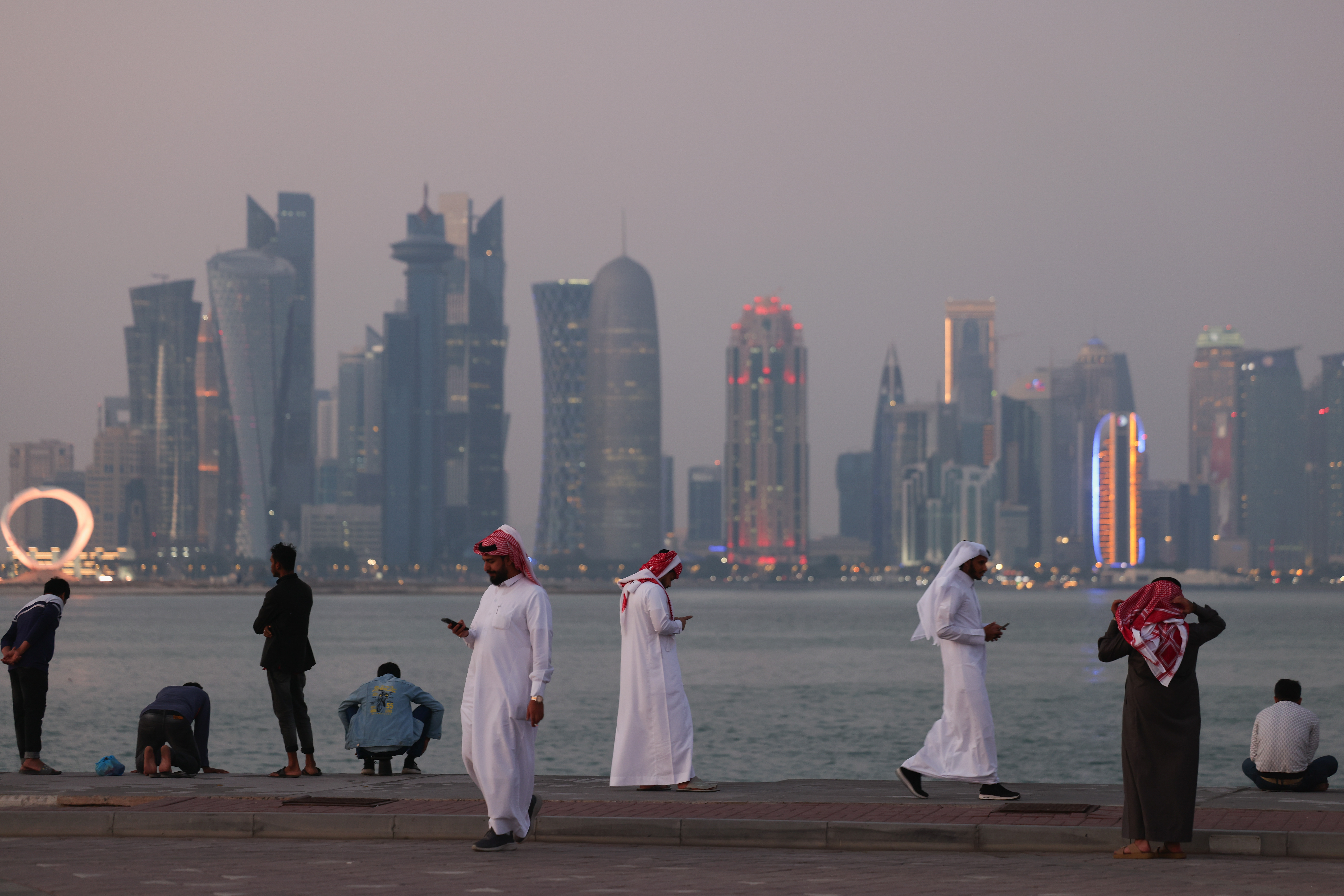Will Trump Compel Qatar to Choose a Side?
The Gulf Arab state's relationship with the United States is complex, with repercussions that extend from Gaza to Texas A&M University.

In February, Texas A&M’s Board of Regents voted to gradually wind down operations in Doha, a move that surprised the hundreds of students, faculty, and others affiliated with the campus, who reported that the decision came without adequate warning or consultation. The university's administration cited a need to concentrate resources closer to Texas and concerns over regional instability as reasons for their exit.
However, I am skeptical of these explanations. The Qatar Foundation, a wealthy state-backed non-profit organization, funds A&M’s operational costs, alongside other U.S. universities situated in the high-tech neighborhood of Education City. Additionally, it's important to note that the Middle East has long dealt with instability, as A&M opened its Doha campus in 2003, the same year the U.S. invaded Iraq. Qatar itself has generally maintained a reputation as a relatively safe enclave in the tumultuous region.
Some believe that U.S. political dynamics—particularly among Republicans overseeing Texas’ public universities—are motivating this closure, driven by suspicions about Qatar and prevalent misinformation. Notably, days before the decision, a report emerged from an antisemitism research group that suggested Qatar might leverage the A&M campus to access sensitive U.S. national security research. A&M's president condemned the report as "false and irresponsible," and the university denies that its closure decision is linked to this controversy, though the timing has raised questions.
“It’s politics and a lack of knowledge about this place,” remarked Francisco Marmolejo, a senior official at the Qatar Foundation, when I pressed for clarity about the closure.
I traveled to Qatar to gain insight into the strategic maneuvers of this small yet immensely resource-rich Gulf nation and to assess any potential changes in its position with a looming return of Donald Trump to the U.S. presidency. With Trump’s allies previously promoting an anti-Qatar narrative, I was surprised to discover the imminent closure of A&M's campus—a development that received scant attention from national U.S. media—seeing it as a possible consequence of Qatar's diplomatic approach.
In essence, Qatar has adopted a policy of maintaining friendships across the spectrum. It plays host to representatives from both Hamas and the Taliban, alongside a U.S. embassy and military base, while also welcoming Israeli officials on occasion. This inclusive diplomatic stance has positioned Qatar as a mediator in various global conflicts, which constitutes a core aspect of its foreign policy, allowing it significant influence.
Nonetheless, this positioning has led to skepticism within the U.S., Israel, and beyond regarding Qatar’s reliability as an ally. Critics argue that the U.S. should not rely on Qatar as either a partner or a mediator.
The nation has long faced scrutiny over diverse issues, ranging from human rights concerns to its financial contributions to U.S. think tanks and the influence of its Al Jazeera media network. This scrutiny has intensified particularly during the last year as Qatar sought to mediate an end to the Israel-Hamas conflict, leading to waves of criticism from Israeli officials, including Prime Minister Benjamin Netanyahu.
In the past year, many U.S. lawmakers have urged the Biden administration to push Qatar to exert more pressure on Hamas for a ceasefire and hostage releases. Some letters expressly demanded accountability from Qatar regarding hostages who remain unreturned.
Prominent lawmakers who have joined this chorus include Sen. Marco Rubio, a potential pick for Secretary of State under Trump, and Rep. Mike Waltz, who is set to serve as Trump’s national security adviser. Several other Trump advisors hold strong pro-Israel views.
While skepticism about Qatar exists across the political spectrum, the most vehement critiques lately have emerged from the right.
Tensions surrounding Qatar’s relationships with Iran—particularly a joint gas field—and the Muslim Brotherhood have tarnished its reputation in the West and strained ties with neighboring Arab states that perceive such connections as threats.
In 2017, several Arab nations severed diplomatic relations with Qatar, although ties were eventually restored in 2021. Nonetheless, lingering suspicions remain regarding Qatar’s intentions and implications for regional stability.
Qatari officials and supporters often dismiss these criticisms. They argue that the U.S. had, for years, accepted Hamas's presence in Qatar to facilitate much-needed communication. Qatar has also historically provided funds to Gaza during Hamas’s governance, purportedly aimed at helping Palestinians, a move reportedly endorsed by Netanyahu to maintain relative calm in the territory.
Nevertheless, critics assert that Qatar's financial support has inadvertently bolstered Hamas's activities, viewing diplomatic pressure on Qatar as a means to constrain the militant group.
When I probed Qatari officials about potential shifts in their diplomatic stance should Trump return to power—possibly aligning more overtly with U.S. and Israeli interests—I sensed a reluctance to make drastic changes. Many suggested that Trump’s aides might reevaluate their aggressive stance towards Doha once they occupied office and faced the intricacies of Middle Eastern dynamics.
“Our partners and friends need an ally in the region who can communicate with political actors whom they don’t directly engage with,” expressed a Qatari official. I allowed anonymity for various participants interviewed to discuss sensitive matters candidly.
With a population of around 3 million—of which only 10 percent are citizens—Qatar’s governance is concentrated among a small group of leaders. There are indications that leadership may be uneasy about the political shifts anticipated under Trump and the expected Republican influence in Washington.
The emir and prime minister prioritized engaging with Trump pre-election and have reportedly welcomed at least one of his envoys to discuss the negotiations surrounding Israel and Hamas, even prior to his inauguration.
“Qatari officials are concerned,” shared Tarik Yousef, a Middle East analyst based in Doha. “They do expect, potentially, a backlash against the very mediation role that Qatar tried to play in the last year, especially given a political establishment dominated by one party that is closely aligned with Israel.”
However, Majed Al-Ansari, spokesperson for Qatar's foreign ministry, assured me that “Qatar’s engagement with the Trump transition team is going very well.”
“Every time we engage, we discuss the active files in various issues, the language is quite positive because they see the work,” he stated.
During my visit, I noted that many current and former U.S. officials from both political parties acknowledged Qatar's crucial role in handling delicate issues that others might avoid.
Qatar has facilitated negotiations to end the U.S. war in Afghanistan, attempted to address the Venezuelan crisis, and engaged in other discreet roles that often escape public recognition. Following the Taliban takeover in Afghanistan, Qatar’s Education City agreed to provide a home for the American University of Afghanistan, aimed at educating girls and others who are otherwise barred from schooling under Taliban rule.
“Qatar is a complicated country, but in some ways, it is the most straightforward and best ally in the region,” commented a senior Biden administration official.
Another official familiar with Middle Eastern dynamics noted that Qatar, which houses thousands of U.S. troops at the Al-Udeid base, is a reliable defense partner that seldom declines U.S. requests.
Despite this cooperation, some assert that Egypt may be more effective than Qatar in persuading Hamas to comply with agreements.
Critics suggest that the U.S. ought to bypass Qatar and engage directly with groups like Hamas when circumstances necessitate, though political constraints usually inhibit such direct interactions. Relying on Qatar could obscure U.S. messaging to these groups, they argue.
“If Qatar is the only option, the U.S. is better off not relying on a middle man at all,” stated Ariel Admoni, an Israeli academic focused on Qatar.
Trump has expressed contrasting views on Qatar, including accusations of its connection to terrorism. However, his son-in-law Jared Kushner reportedly has significant financial ties to Qatar, as do other individuals within Trump’s sphere. A former aide indicated that, despite “the anti-Qatar sentiment among some Trump people,” the emir of Qatar is likely to receive annual invitations to the White House during Trump's presidency.
According to Yousef, the Doha-based analyst, Qatar needs to diversify its alliances in anticipation of the upcoming years. “You need to get closer to the Saudis, you need to get closer to the Emiratis, and you need to start taking the Asians much more seriously, including the Chinese,” he commented.
However, the former Trump aide cautioned that if anything might displease Trump about Qatar, it would involve closer ties with Beijing, particularly regarding cybersecurity and technology.
Qatar has its boundaries, refusing to cross certain lines. It notably declined to pursue rapprochement with Syrian dictator Bashar Assad, even appointing Syrian opposition activists to handle embassy functions in Doha. As Assad's regime has come under pressure, Qatar has brought together multiple external parties with vested interests in Syria.
Qatari officials contend that their mediation efforts aim to help stabilize a volatile region. However, the negative repercussions of their willingness to engage with various factions can resonate widely.
During my stay in Doha, I attended a reception hosted by the Qatar Foundation, where I met individuals connected to the A&M campus, which, due to contractual agreements, will be gradually phased out over four years. “It was a total shock,” one student expressed regarding the closure. “But what can you do? We have a beautiful family there.”
Qatari government officials avoided responding to my inquiries concerning the A&M situation.
The criticism of Qatar is unlikely to diminish, regardless of its validity. However, I remain convinced that excluding Qatar from the geopolitical equation is improbable.
Both Democratic and Republican administrations are likely to recognize Qatar’s necessity. Despite its ties with various controversial actors, the reality is that these actors require engagement. Qatar carries too much weight in crucial matters to be easily supplanted.
Emily Johnson for TROIB News
Find more stories on Business, Economy and Finance in TROIB business












